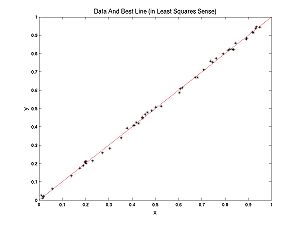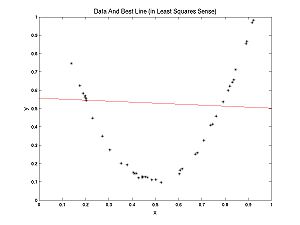Difference between revisions of "Selection"
(→What is Model Selection?) |
(→What is Model Selection?) |
||
| Line 11: | Line 11: | ||
Clearly, in the second case, it would be more appropriate to fit a parabola to the data, rather than a line. How would we do that? | Clearly, in the second case, it would be more appropriate to fit a parabola to the data, rather than a line. How would we do that? | ||
| − | A parabola is described by the formula: <big> <math> y = a x^2 + m x + b. </math> < | + | A parabola is described by the formula: <big> <math> y = a x^2 + m x + b. </math> </big> This is a line with a new term, a*x^2. To fit a parabola, first determine the errors in the data as before: |
<math> Error(x,y,a,m,b) = a x^2 + m x + b - y </math> | <math> Error(x,y,a,m,b) = a x^2 + m x + b - y </math> | ||
| Line 17: | Line 17: | ||
Now define the penalties, (let's be sensible and use LS rather the UG penalties): | Now define the penalties, (let's be sensible and use LS rather the UG penalties): | ||
| − | <math> Penalty(x,y,a,m,b) = Error(x,y,a,m,b)^2 < | + | <math> Penalty(x,y,a,m,b) = Error(x,y,a,m,b)^2 </math> |
And finally the cost function | And finally the cost function | ||
| − | <math> Cost(a,m,b) = \sum_{data} Penalty(x,y,a,m,b) < | + | <math> Cost(a,m,b) = \sum_{data} Penalty(x,y,a,m,b) </math> |
Revision as of 15:53, 22 April 2009
First, the homework from Lab W.
What is Model Selection?
What is model selection? To answer this question let's contrast model selection with parameter estimation. In the Optimization Lab, we fit lines to data. We were doing parameter estimation, trying to estimate the parameters m and b, in the formula for a line y = m*x + b. Recall my examples: we fit a line to nearly linear data and another line to nearly parabolic data.
Clearly, in the second case, it would be more appropriate to fit a parabola to the data, rather than a line. How would we do that?
A parabola is described by the formula:  This is a line with a new term, a*x^2. To fit a parabola, first determine the errors in the data as before:
This is a line with a new term, a*x^2. To fit a parabola, first determine the errors in the data as before:

Now define the penalties, (let's be sensible and use LS rather the UG penalties):

And finally the cost function


